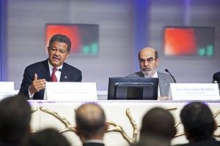
7 Jul, 2012
UN Food Agency Blasts Human Cost of Speculation in Commodities, Crops
6 July 2012, Rome (UN Food and Agriculture Organisation Media Release) – The world needs to take a hard look at speculation on the financial markets and its potential impact on food price volatility, FAO Director-General José Graziano da Silva said today at a high-level debate on the issue at FAO Headquarters in Rome.
“While there has been much analysis of food price volatility, including at FAO, more understanding is still needed, especially concerning the impacts of speculation,” Graziano da Silva said as he opened the event.

Leonel Fernández Reyna, President, Dominican Republic with FAO Director-General José Graziano da Silva
“Let’s make one thing clear: We are not talking about speculation related to price discovery and the normal functioning of the futures markets. We are talking about excessive speculation in derivative markets, which can increase price swings and their speed,” he added.
“Excessive food price volatility, especially at the speed at which they have been occurring since 2007, has negative impacts on poor consumers and poor producers alike all over the world.”
The high-level debate on the theme, “Food Price Volatility and the Role of Speculation,” featured as keynote speaker Leonel Fernández Reyna, President of the Dominican Republic. The event drew a panel of international experts on commodities, trade and agriculture.
President Fernández said food price swings were having a “tremendous human impact” and cautioned against using food commodities purely as financial instruments.
“Financial speculation is exacerbating market fluctuations and this exacerbation is generating uncertainty – this uncontrolled, unregulated exacerbation is provoking a dramatic impact on countries that are net food importers,” Fernández said.
“We are not talking about an abstract concept here, we are talking about something that is having a devastating, dramatic and brutal impact on the lives of people,” and also puts governments at risk of destabilization, he said.
“I think that this is one of the most serious problems, one of the most important challenges facing us, and which we will need to address with efficiency, transparency and a spirit of solidarity,” he said.
Fernández underscored the need for more information to get a clearer picture on market transactions, in order to better understand the role of speculation in agricultural commodities.
President Fernández has been instrumental in getting the United Nations to heighten the attention on the issue of excessive food price volatility. In December 2011, the United Nations General Assembly adopted a resolution presented by the Dominican Republic on “Addressing Excessive Price Volatility in Food and Related Financial and Commodity Markets.”
Controversial topic
A UN debate in April 2012 provided an opportunity for Heads of State and Government, along with other high level officials and international organizations, to discuss the issue at a political level, while the FAO event took the process a step further. It looked, specifically, at the extent to which speculative behavior on commodity futures markets was contributing to food price volatility. It also focused on associated regulatory issues.
“The view that speculation contributed to recent price volatility has led to more awareness among governments on the need for the introduction of greater regulation to limit this activity. However, the question of how much and what form of regulation is polemic,” Graziano da Silva said.
In recent years, especially since 2007, the world has seen the reversal of a four-decade-long downward tendency in prices of agricultural commodities. The period between 2008 and 2011 was characterized by a series of extreme peaks and valleys in food pricing which made it especially difficult for economically vulnerable consumers and agricultural producers to cope.
“Food price inflation has already been higher than overall inflation in almost every country. This has a greater impact on the poorer population, who can spend up to 75 percent of their income in food,” Graziano da Silva said.
FAO analysis
In 2011, FAO, together with OECD, coordinated the preparation of the inter-agency report to the G20 on this subject. At the request of the G20, FAO also hosts the Agricultural Market Information System (AMIS), aimed at promoting market transparency.
In addition, FAO conducts analytical work to help deepen the understanding of the nature, causes, impacts and responses to volatility. This includes looking into the increasingly complex inter-relationships between agricultural, financial and energy markets.
Championing food security
Before the high-level debate, Director-General Graziano da Silva invited Margarita Cedeño de Fernández, First Lady of the Dominican Republic, to continue serving as Extraordinary Ambassador of FAO, in recognition of the numerous social development projects in food and agriculture she has undertaken in her own country, many of which have benefited women.
The First Lady was first nominated to the role in 2009. She stressed that she would continue to be at the forefront of the global fight against hunger, malnutrition and poverty.



Liked this article? Share it!